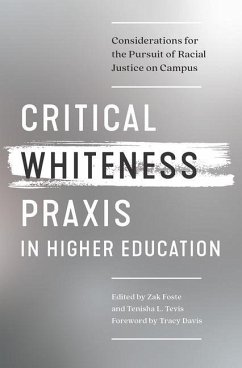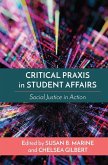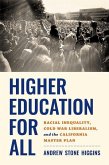Critical Whiteness Praxis in Higher Education
Considerations for the Pursuit of Racial Justice on Campus
Herausgeber: Foste, Zak; Tevis, Tenisha L
Critical Whiteness Praxis in Higher Education
Considerations for the Pursuit of Racial Justice on Campus
Herausgeber: Foste, Zak; Tevis, Tenisha L
- Broschiertes Buch
- Merkliste
- Auf die Merkliste
- Bewerten Bewerten
- Teilen
- Produkt teilen
- Produkterinnerung
- Produkterinnerung
This book bridges theoretical and practical considerations regarding the ways whiteness functions to underwrite racially hostile and unwelcoming campus communities for People of Color, all the while upholding the interests and values of white students, faculty, and staff.
Andere Kunden interessierten sich auch für
![Critical Praxis in Student Affairs Critical Praxis in Student Affairs]() Critical Praxis in Student Affairs46,99 €
Critical Praxis in Student Affairs46,99 €![The Community's College The Community's College]() Robert L PuraThe Community's College43,99 €
Robert L PuraThe Community's College43,99 €![Asians in the Ivory Tower Asians in the Ivory Tower]() Robert T TeranishiAsians in the Ivory Tower41,99 €
Robert T TeranishiAsians in the Ivory Tower41,99 €![Higher Education for All Higher Education for All]() Andrew Stone HigginsHigher Education for All36,99 €
Andrew Stone HigginsHigher Education for All36,99 €![Rethinking Elementary Education: Teaching for Racial and Cultural Justice Rethinking Elementary Education: Teaching for Racial and Cultural Justice]() Rethinking Elementary Education: Teaching for Racial and Cultural Justice21,99 €
Rethinking Elementary Education: Teaching for Racial and Cultural Justice21,99 €![The State Must Provide The State Must Provide]() Adam HarrisThe State Must Provide16,99 €
Adam HarrisThe State Must Provide16,99 €![Unwrapped: The Pursuit of Justice for Women Educators Unwrapped: The Pursuit of Justice for Women Educators]() Kendra Washington-BassUnwrapped: The Pursuit of Justice for Women Educators21,99 €
Kendra Washington-BassUnwrapped: The Pursuit of Justice for Women Educators21,99 €-
-
-
This book bridges theoretical and practical considerations regarding the ways whiteness functions to underwrite racially hostile and unwelcoming campus communities for People of Color, all the while upholding the interests and values of white students, faculty, and staff.
Produktdetails
- Produktdetails
- Verlag: Taylor & Francis Ltd (Sales)
- Seitenzahl: 289
- Erscheinungstermin: 29. Juli 2022
- Englisch
- Abmessung: 226mm x 150mm x 20mm
- Gewicht: 408g
- ISBN-13: 9781642672695
- ISBN-10: 1642672696
- Artikelnr.: 62567682
- Verlag: Taylor & Francis Ltd (Sales)
- Seitenzahl: 289
- Erscheinungstermin: 29. Juli 2022
- Englisch
- Abmessung: 226mm x 150mm x 20mm
- Gewicht: 408g
- ISBN-13: 9781642672695
- ISBN-10: 1642672696
- Artikelnr.: 62567682
Zak Foste is an Assistant Professor of Higher Education Administration at the University of Kansas. His research critically explores whiteness in American higher education. This work examines both how whiteness functions to underwrite racially hostile and unwelcoming campus climates for Students of Color and the ways in which white college students understand their relationship to race and whiteness. His most recent work has examined how whiteness structures students' experiences in campus residence halls and community service-learning programs. Zak received his bachelors degree in sociology and political science from Western Illinois University, his masters degree in Student Affairs in Higher Education from Miami University, and his Ph.D. in Higher Education & Student Affairs from The Ohio State University. Tenisha L. Tevis is an Assistant Professor of Adult and Higher Education at Oregon State University. She earned her Ph.D. in Educational Theory and Policy Studies with a cognate in Higher Education from The Pennsylvania State University, and B.A. and M.A. degrees in Sociology from California State University Sacramento. As a praxis scholar, her research attempts to disrupt dominant ideologies and biased institutional practices, in two substantive and intersecting areas: students' transition to college - exploring how marginalized students continue to be disenfranchised by inequitable practices, and the confluence of leadership and identity in higher education - understanding how leadership practices contribute to the patterns of inequality and exclusion. Her most recent work explores Black women's and white women's leadership, respectively, and includes a systematic review of the college access literature to better inform college advising of Black students.
Foreword-Tracy Davis Acknowledgments 1. On The Enormity of Whiteness in
Higher Education -Zak Foste & Tenisha L. Tevis Part One. Theoretical
Foundations 2. Toward Definitions of Whiteness and Critical Whiteness
Studies. Disruption & Response-ability-Moria L. Ozias & Penny A. Pasque 3.
White Normativity. Tracing Historical and Contemporary (Re)Productions of
Whiteness in Higher Education-Lauren N. Irwin 4. White Racial Ignorance.
White Lies and Inverted Epistemologies-Chris Corces-Zimmerman & Tonia Guida
5. Relinquishing White Innocence. Slaying a Defender of White Supremacy-
Douglas H. Lee, Ellie Ash-Bala, Anton Ward-Zanotto, James Black, and OiYan
A. Poon Part Two. Practical Considerations 6. Epistemic Asphyxiation.
Whiteness, Academic Publishing, and the Suffocation of Black Knowledge
Production-Wilson Kwamogi Okello 7. Dear White People. Black Women
Students' Perspective-Kenyona N. Walker & Lori D. Patton 8. How Whiteness
Werqs in LGBTQ Centers-Alex C. Lange, Antonio Duran, & Romeo Jackson 9.
Interrogating Whiteness in Sorority and Fraternity Life-Cameron C. Beatty &
Crystal E. Garcia 10. The Permeation of Whiteness in Student Leadership
Organizations-Brittany M. Williams, Bryan K. Hotchkins, & Meg E. Evans 11.
Possibilities and Foreclosures. Exploring the Relationship Between
Whiteness and Anti-Blackness in Higher Education-Tenisha L. Tevis & Natasha
Croom 12. The White Racial Engagement Model. Unlearning the Oppressive
Conditioning of Whiteness-Melvin A. Whitehead, Erin Weston, & Meg E. Evans
13. Whiteness and the Erasure of Indigenous Perspectives in Higher
Education-Jameson D. Lopez & Felisia J. Tagaban 14. Starting from the
Margins. Reflections on Challenging Whiteness in Higher Education-Zak Foste
& Melvin A. Whitehead Editors and Contributors Index
Higher Education -Zak Foste & Tenisha L. Tevis Part One. Theoretical
Foundations 2. Toward Definitions of Whiteness and Critical Whiteness
Studies. Disruption & Response-ability-Moria L. Ozias & Penny A. Pasque 3.
White Normativity. Tracing Historical and Contemporary (Re)Productions of
Whiteness in Higher Education-Lauren N. Irwin 4. White Racial Ignorance.
White Lies and Inverted Epistemologies-Chris Corces-Zimmerman & Tonia Guida
5. Relinquishing White Innocence. Slaying a Defender of White Supremacy-
Douglas H. Lee, Ellie Ash-Bala, Anton Ward-Zanotto, James Black, and OiYan
A. Poon Part Two. Practical Considerations 6. Epistemic Asphyxiation.
Whiteness, Academic Publishing, and the Suffocation of Black Knowledge
Production-Wilson Kwamogi Okello 7. Dear White People. Black Women
Students' Perspective-Kenyona N. Walker & Lori D. Patton 8. How Whiteness
Werqs in LGBTQ Centers-Alex C. Lange, Antonio Duran, & Romeo Jackson 9.
Interrogating Whiteness in Sorority and Fraternity Life-Cameron C. Beatty &
Crystal E. Garcia 10. The Permeation of Whiteness in Student Leadership
Organizations-Brittany M. Williams, Bryan K. Hotchkins, & Meg E. Evans 11.
Possibilities and Foreclosures. Exploring the Relationship Between
Whiteness and Anti-Blackness in Higher Education-Tenisha L. Tevis & Natasha
Croom 12. The White Racial Engagement Model. Unlearning the Oppressive
Conditioning of Whiteness-Melvin A. Whitehead, Erin Weston, & Meg E. Evans
13. Whiteness and the Erasure of Indigenous Perspectives in Higher
Education-Jameson D. Lopez & Felisia J. Tagaban 14. Starting from the
Margins. Reflections on Challenging Whiteness in Higher Education-Zak Foste
& Melvin A. Whitehead Editors and Contributors Index
Foreword-Tracy Davis Acknowledgments 1. On The Enormity of Whiteness in
Higher Education -Zak Foste & Tenisha L. Tevis Part One. Theoretical
Foundations 2. Toward Definitions of Whiteness and Critical Whiteness
Studies. Disruption & Response-ability-Moria L. Ozias & Penny A. Pasque 3.
White Normativity. Tracing Historical and Contemporary (Re)Productions of
Whiteness in Higher Education-Lauren N. Irwin 4. White Racial Ignorance.
White Lies and Inverted Epistemologies-Chris Corces-Zimmerman & Tonia Guida
5. Relinquishing White Innocence. Slaying a Defender of White Supremacy-
Douglas H. Lee, Ellie Ash-Bala, Anton Ward-Zanotto, James Black, and OiYan
A. Poon Part Two. Practical Considerations 6. Epistemic Asphyxiation.
Whiteness, Academic Publishing, and the Suffocation of Black Knowledge
Production-Wilson Kwamogi Okello 7. Dear White People. Black Women
Students' Perspective-Kenyona N. Walker & Lori D. Patton 8. How Whiteness
Werqs in LGBTQ Centers-Alex C. Lange, Antonio Duran, & Romeo Jackson 9.
Interrogating Whiteness in Sorority and Fraternity Life-Cameron C. Beatty &
Crystal E. Garcia 10. The Permeation of Whiteness in Student Leadership
Organizations-Brittany M. Williams, Bryan K. Hotchkins, & Meg E. Evans 11.
Possibilities and Foreclosures. Exploring the Relationship Between
Whiteness and Anti-Blackness in Higher Education-Tenisha L. Tevis & Natasha
Croom 12. The White Racial Engagement Model. Unlearning the Oppressive
Conditioning of Whiteness-Melvin A. Whitehead, Erin Weston, & Meg E. Evans
13. Whiteness and the Erasure of Indigenous Perspectives in Higher
Education-Jameson D. Lopez & Felisia J. Tagaban 14. Starting from the
Margins. Reflections on Challenging Whiteness in Higher Education-Zak Foste
& Melvin A. Whitehead Editors and Contributors Index
Higher Education -Zak Foste & Tenisha L. Tevis Part One. Theoretical
Foundations 2. Toward Definitions of Whiteness and Critical Whiteness
Studies. Disruption & Response-ability-Moria L. Ozias & Penny A. Pasque 3.
White Normativity. Tracing Historical and Contemporary (Re)Productions of
Whiteness in Higher Education-Lauren N. Irwin 4. White Racial Ignorance.
White Lies and Inverted Epistemologies-Chris Corces-Zimmerman & Tonia Guida
5. Relinquishing White Innocence. Slaying a Defender of White Supremacy-
Douglas H. Lee, Ellie Ash-Bala, Anton Ward-Zanotto, James Black, and OiYan
A. Poon Part Two. Practical Considerations 6. Epistemic Asphyxiation.
Whiteness, Academic Publishing, and the Suffocation of Black Knowledge
Production-Wilson Kwamogi Okello 7. Dear White People. Black Women
Students' Perspective-Kenyona N. Walker & Lori D. Patton 8. How Whiteness
Werqs in LGBTQ Centers-Alex C. Lange, Antonio Duran, & Romeo Jackson 9.
Interrogating Whiteness in Sorority and Fraternity Life-Cameron C. Beatty &
Crystal E. Garcia 10. The Permeation of Whiteness in Student Leadership
Organizations-Brittany M. Williams, Bryan K. Hotchkins, & Meg E. Evans 11.
Possibilities and Foreclosures. Exploring the Relationship Between
Whiteness and Anti-Blackness in Higher Education-Tenisha L. Tevis & Natasha
Croom 12. The White Racial Engagement Model. Unlearning the Oppressive
Conditioning of Whiteness-Melvin A. Whitehead, Erin Weston, & Meg E. Evans
13. Whiteness and the Erasure of Indigenous Perspectives in Higher
Education-Jameson D. Lopez & Felisia J. Tagaban 14. Starting from the
Margins. Reflections on Challenging Whiteness in Higher Education-Zak Foste
& Melvin A. Whitehead Editors and Contributors Index








